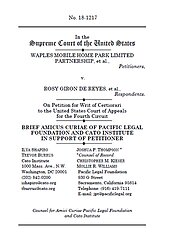Learn more about Cato’s Amicus Briefs Program.
The federal Fair Housing Act (“FHA”) makes it unlawful to discriminate based on race (among other categories) in the sale, rental, and financing of housing. Four years ago, in a case called Texas Department of Housing v. Inclusive Communities Project, the Supreme Court determined that the FHA allows certain claims based on “disparate impact”—meaning that tenants don’t need to prove discriminatory intent behind housing policies, only an adverse effect on members of their protected class, even if it was the unintended result of an otherwise neutral policy.
Enter Waples Mobile Home Park in Fairfax County, Virginia. Waples rents primarily to Hispanic tenants, but, to avoid violating federal immigration policy, it requires all community residents to provide their social security numbers or otherwise show proof of legal immigration status. Several current and former tenants filed an FHA complaint against Waples, alleging that this policy has a racially disparate impact. Why? Because most undocumented people in Fairfax County are Hispanic.
Although the trial court threw out the case, the U.S. Court of Appeals for the Fourth Circuit ruled for the tenants. According to the court, a mere showing of statistical disparity is enough to establish a valid claim. But, as the Supreme Court in Inclusive Communities emphasized, “[w]ithout adequate safeguards … disparate-impact liability might cause race to be used and considered in a pervasive way and ‘would almost inexorably lead’ governmental or private entities to use ‘numerical quotas,’ and serious constitutional questions then could arise.” One of those important safeguards, called the “robust causality” requirement, makes sure that housing providers aren’t punished for racial imbalances they didn’t cause.
Waples is not, and cannot, be responsible the geographic distribution of undocumented individuals within the United States. It simply isn’t the park’s fault that most undocumented people in Fairfax County happen to be Hispanic. Its policy of requiring tenants to provide proof of immigration status thus could not have “caused” a disparate impact. Allowing FHA claims based on this sort of coincidence would destroy the Inclusive Communities safeguards and shift the burden to housing providers to prove the absence of discrimination. Doing so will only undermine the core purpose of the FHA—to decrease racial bias in housing decisions—by encouraging more race-based decision-making among housing providers for fear of being sued.
Waples is petitioning the Supreme Court to review the Fourth Circuit’s misguided decision. Cato has joined the Pacific Legal Foundation on an amicus brief supporting that petition. The Court should take this case and preserve the carefully balanced safeguards Justice Anthony Kennedy established in his Inclusive Communities majority opinion. Punishing housing providers for racial imbalances they didn’t cause will only move the nation even further away from the ideal that our “Constitution is color-blind, and neither knows nor tolerates classes among citizens.”

This work is licensed under a Creative Commons Attribution-NonCommercial-ShareAlike 4.0 International License.
